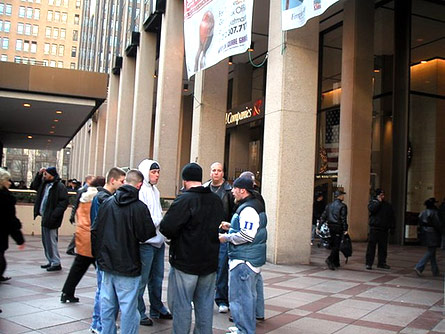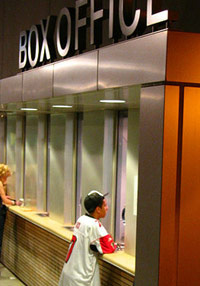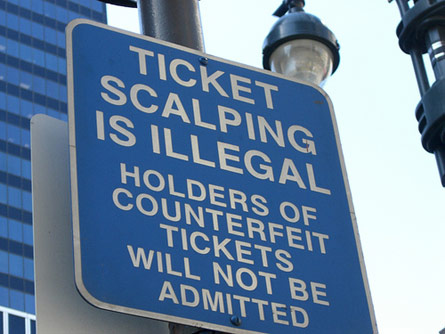
"Buying?" "Selling?" "I got box seats," the scalpers furtively muttered as I walked to Yankee Stadium.
It was a beautiful Saturday in the Bronx - perfect for watching the Yankees. The bleacher seat I coveted was sold out both at the box office and online at Ticketmaster, the Yankee's authorized sales outlet, so I found myself nervously approaching scalpers two blocks from the stadium. The process quickly became uncomfortable. One group of scalpers started fighting over who got to approach me first, while another followed me for a block, angrily demanding to know why I didn't want a ticket in another section.
Not long ago, I would have been out of luck. For years, the only option for a fan seeking a sold-out seat was to buy an illegally scalped ticket, risking an unpleasant interaction, a counterfeit ticket or, in the worst-case scenario, arrest. Fortunately, the day before I had logged on to StubHub and purchased a bleacher seat for $8, plus a $15 service charge, from an anonymous seller.
By buying a resold ticket on StubHub, I became part of a booming secondary market for tickets, which grossed close to $3 billion in the United States in 2006. This largely on-line system charges buyers and sellers a commission in exchange for offering a safe and secure way to sell already purchased tickets. And on June 1, Governor Eliot Spitzer endorsed this approach to ticket scalping, signing legislation that removes from the books almost all of the restrictions on the resale of tickets that have existed since the 1920s. In doing so, New York joined other states that have relaxed laws on reselling tickets. "Ticket scalping laws historically have not worked," said Spitzer. "I think permitting a free market to work its magic there is the smart approach."
Supporters of the new open market believe the new law will fundamentally transform the experience of buying and selling tickets to rock concerts, baseball games and theater performances, promising more choice and convenience for consumers. But others, including some consumer advocates, fear this free-for-all will raise ticket prices, putting many events out of the reach of average New Yorkers.
CHANGING THE SYSTEM

Old anti-scalping legislation allowed only licensed agents to resell tickets. And even they faced restrictions. Tickets to events in large arenas such as Yankee Stadium could be sold for no more than 45 percent above face value. For smaller venues, like a Broadway theater, the limit was 20 percent above the original ticket price.
Under the new law, regular fans, small-scale entrepreneurs and large-scale ticket brokers can all sell tickets - and they can charge as much as they want. Scalping in close proximity to concert halls and baseball stadiums, though, remains illegal. That means my unsuccessful attempt to buy a resold ticket near Yankee Stadium was illegal, while my purchase of the ticket online was perfectly legal. Professional ticket brokers must register with the state and pay a fee, but fans planning to sell fewer than six tickets to a single event are free to do so as they please.
The new legislation also helps websites like StubHub by expressly prohibiting the Yankees and other teams from punishing season ticket holders who resell their unused tickets online. Previously, the Yankees had claimed that the resale of tickets by fans violated the contracts signed by season ticket holders. For example, according to the New York Times, the team revoked a season ticket held by Orlando Bautista, a doctor from Smithtown, New York who had sold six tickets to a game through StubHub.
The legislation has to be renewed in two years, giving hope to opponents of the law, such as consumer advocate Russ Haven of the New York Public Interest Group, that anti-scalping legislation will be restored.
PRODUCERS VS. SPECULATORS
The term "scalping" has been around since the 1880s, when it referred to speculators who bought stocks and grains with the intention of selling them for profit, as well as to agents who sold fake train tickets to passengers. Scalping admission to cultural events has been an issue at least since the 1920s, when New York passed the first anti-scalping legislation.
Until recently, theater owners, sports franchises and other event producers seemed locked in an eternal conflict with ticket speculators. The owners and producers tried to limit the secondary market, while speculators searched for new ways to get their hands on low-priced tickets. The logic behind this conflict was simple: Producers tend to charge less than the market will bear for tickets, either to guarantee a full house or to ensure that regular fans can attend a performance. Ticket speculators have no such scruples and simply want to maximize their profits. Ticket prices also tend to be hard to set in advance, creating opportunities for speculators to buy low and sell high - or to lose money if, for example, a play highly touted in advance turns out to be a box office bomb.
Speculators have resorted to an astounding variety of schemes to get their hands on cheap tickets. The strategies described in a 1999 report issued by then-Attorney General Eliot Spitzer include: hiring "diggers," typically homeless people to stand in line at the box office to buy up as many tickets as possible; using high-speed dialing equipment to buy tickets sold over the phone; and paying "ice," or bribes, to box office employees willing to illegally set tickets aside.
In one case, scalpers opened a counterfeit Ticketmaster outlet with the sole purpose of diverting allotted tickets for resale on the black market. A bogus Long Island outlet sold its sixth set of allotted Barbara Streisand concert tickets to the first person in line, and its 22nd set of tickets to the sixth person in line, the report said, "leading to the conclusion that the outlet operator was setting aside or purchasing tickets, in between sales, for resale to a ticket broker for personal profit." As a result, approximately 50 percent of the seats never went on public sale
In response to such tactics, some theater owners and rock bands tried to fight back. In 2006, the rock musician Tom Petty voided 600 tickets sold through a fan club web site after he discovered that tickets were being re-sold at several times face their value. Petty then offered the tickets for resale on the site, but required that buyers show up to the concert with photo identification to ensure that they were the original purchasers of the tickets.
CALLING A TRUCE?
The Internet emerged to dramatically change the equation. It transformed the sometimes shady world of secondary ticket sales into a safe, secure and booming business. Companies like StubHub, started in 2000 by two Stanford business school graduates and sold to Ebay last year for $310 million, make money by serving as a third party between anonymous buyers and sellers. According to spokesman Sean Pate, 3.3 million tickets were sold on the site last year. By charging both buyers and sellers a 10 percent commission on each sale StubHub garnered over $400 million in gross revenues, a significant slice of the $3 billion generated in online secondary ticket sales nationwide.
Policing secondary ticket sales, which was always difficult, became virtually impossible with the new technologies. This was particularly true in New York, where the anti-scalping law was relatively toothless. All secondary market companies had to do to evade the law was set up shop out of state. And so, according to estimates reported in Playbill, New York City accounted for one-third of all secondary market sales nationwide.
 Last year, Broadway owners, long-standing supporters of strict scalping regulations, signaled that they would not oppose legislation ending most restrictions on ticket scalping. In a letter to state officials, Gerald Schoenfeld, chairman of the League of American Theatres and Producers, wrote, "Ticket prices would probably not skyrocket if the cap placed on the resale of tickets were to be lifted." Instead, according to Schoenfeld, "an increase in the number of legal resellers (who comply with licensing and other regulations) will increase legal competition in the marketplace and drive prices down."
Last year, Broadway owners, long-standing supporters of strict scalping regulations, signaled that they would not oppose legislation ending most restrictions on ticket scalping. In a letter to state officials, Gerald Schoenfeld, chairman of the League of American Theatres and Producers, wrote, "Ticket prices would probably not skyrocket if the cap placed on the resale of tickets were to be lifted." Instead, according to Schoenfeld, "an increase in the number of legal resellers (who comply with licensing and other regulations) will increase legal competition in the marketplace and drive prices down."
And the legislation passed this year gives special inducements to theater owners. Those operating venues with 5,000 or fewer seats will have the exclusive right to open resale offices within the 500-foot scalp-free buffer zone. As with StubHub, theater resale offices would make a profit by taking a commission on each ticket sale.
Sports teams have also joined the secondary market stampede. The Mets have their own service, Mets Ticket Marketplace, where season ticket holders can sell individual game tickets for a 10 percent service fee. The Yankees have announced plans to launch their own site, called Pinstripe Management.
THE EFFECT ON TICKET PRICES
The most important issue for many fans is whether or not ticket prices will rise as a result of the new law. According to Pate and Schoenfeld, ticket buyers will benefit from the expansion of the secondary market, because the ease and security of the Internet will make more tickets available for resale. And Economics 101 holds that greater supply leads to lower ticket prices. At the same time, by giving consumers multiple options to choose from, sites like Stubhub.com remove the "information asymmetry" problem common to ticket scalping. It's the difference between furtively approaching a number of ticket scalpers in front of Yankee stadium and reviewing information about ticket prices on the Internet.
But not everyone is convinced. Some argue that an open secondary market will relentlessly increase demand, and thus prices, for tickets. "All this free market stuff is a lot of hooey," Haven of the New York Public Interest Group said. To Haven, ticket sales "are not a traditional marketplace" because the supply of tickets to popular shows can't be increased to match the demand. The result will be a world where "consumers compete against corporate expense accounts for the best seats." While some might say that that is the way things should be in a capitalist system, Haven believes that the fact that most stadiums are subsidized by public dollars also gives "taxpayers a greater interest in fair distribution of tickets at fair prices."
In a contrarian's view, University of Texas economist Craig A. Depken found that cities with anti-scalping laws charge an average of $2 more per game for baseball tickets and $10 for football tickets, essentially because hard-core fans may be willing to pay more than speculators for advance tickets to games where the game's true value is unknown. For example, a ticket speculator might figure that a late September game between the Yankees and Toronto Blue Jays, both currently about 10 games behind division-leading Boston, would be an exercise in futility for both teams - and not a good investment. A die-hard fan would be more likely to imagine the Yankees being locked in a hot pennant race at that point and so would eagerly buy a high priced ticket now to insure being in on any late-season action.
Those knowledgeable about the buying and selling of tickets can cite examples where a free market would bring up prices - and other cases where it might result in lower costs for fans.
In 2002, Princeton University economist Alan B. Krueger sent 12 graduate students to Bruce Springsteen's "The Rising Tour" concert in Philadelphia, where close to 20,000 tickets had been sold for a uniform price of $75. The students interviewed 858 fans and found that between 20 and 25 percent of the fans surveyed had scalped a ticket, at an average price of $280. If all the tickets had been sold at the "market" price of $280 (the average price fans were willing to pay), Springsteen could have collected an incredible $4 million in revenues over and above the $1.5 million he made from selling 20,000 tickets at $75 apiece.
On the other hand, tickets for Barbra Streisand's farewell tour last year, where prices ranged from $150 to $5,000, could be bought for only a quarter of the full price online. "I got three $850 tickets for only $750 from a guy on Craigslist," said concertgoer Ronald Butts. "It's evidence that the free market works both ways."
There are creative strategies that sports teams, theater producers and artists can employ to keep ticket prices low - if they choose to use them.

One example is Tom Petty's method of requiring identification to ensure that cheap tickets are being used by the original purchaser. Another is the strategy used by the Public Theater for Shakespeare in the Park. Fans arrive as early as 6 a.m. to line up for free tickets, which are distributed the day of the performance. Each person can get only two tickets, and monitors make sure that people do not jump the line or join friends who are ahead in the queue. In essence, the Public Theater gives fans the opportunity to trade time for money, while limiting opportunities for scalping. In addition, the Public Theater sells a small number of premium tickets for $150 apiece, giving consumers who don't want to wait in line another option.
Independent of the effects of ticket scalping, ticket prices have been rising in recent years, particularly for superstar events like The Police concert tour and the Super Bowl and Broadway musicals. In 1953, for example, orchestra seats for "The King and I" went for $14 in today's dollars, far less than the $65 charged for cheap seats at popular musicals today.
The Sleaze Factor
Price aside, many patrons are pleased to be rid of the illegal scalpers. Fans waiting in line to pick up their tickets at StubHub's Last Minute Service Center four blocks from Yankee Stadium agreed that StubHub's biggest advantage over illegal scalping was security. For example, the company offers refunds on tickets that are counterfeit or arrive too late. As one customer picking up two tickets said, "If you go to an [illegal] scalper, you never know what you're going to get."
Karl Silcox, manager of StubHub's Last Minute Service said that, perhaps in recognition of this some illegal scalpers are already starting to sell their tickets through StubHub instead of in front of Yankee Stadium, although he hastened to add that it's the "more respectable guys" who are choosing that option. Over time, the law might put the worst of the ticket scalpers out of business, or at least force them to change their ways.
Back at Yankee Stadium, I settled into my bleacher seat, where my $5 soft-serve ice cream quickly melted in the hot sun. I was pleased with my vantage point - and the price I had paid for it. Still, some things remain open to chance. Despite all the hard work I put into getting a ticket to the game, the A's battered the Yankees 7-0.
Aubrey Fox is project director of Bronx Community Solutions, aimed at changing the Bronx court system's approach to low-level crime.
Â




